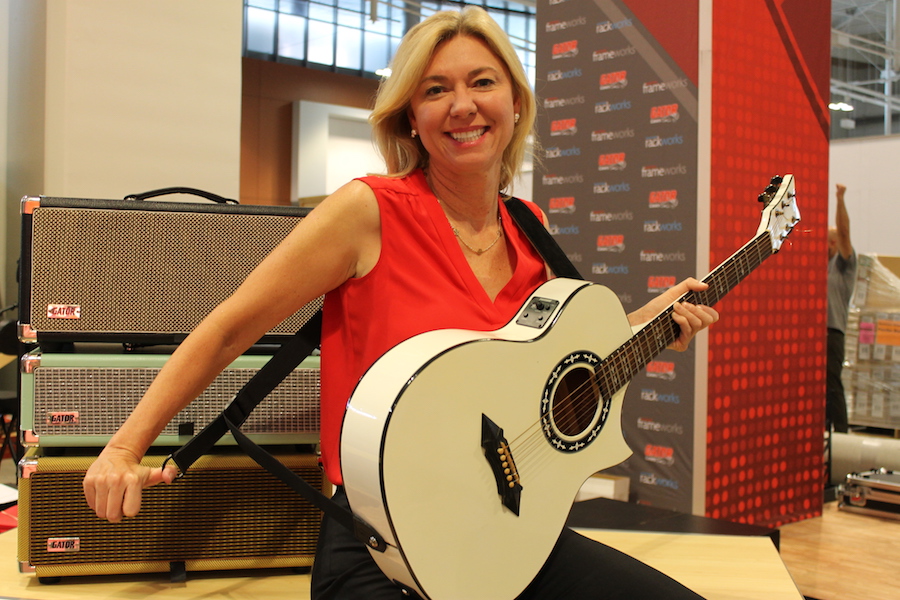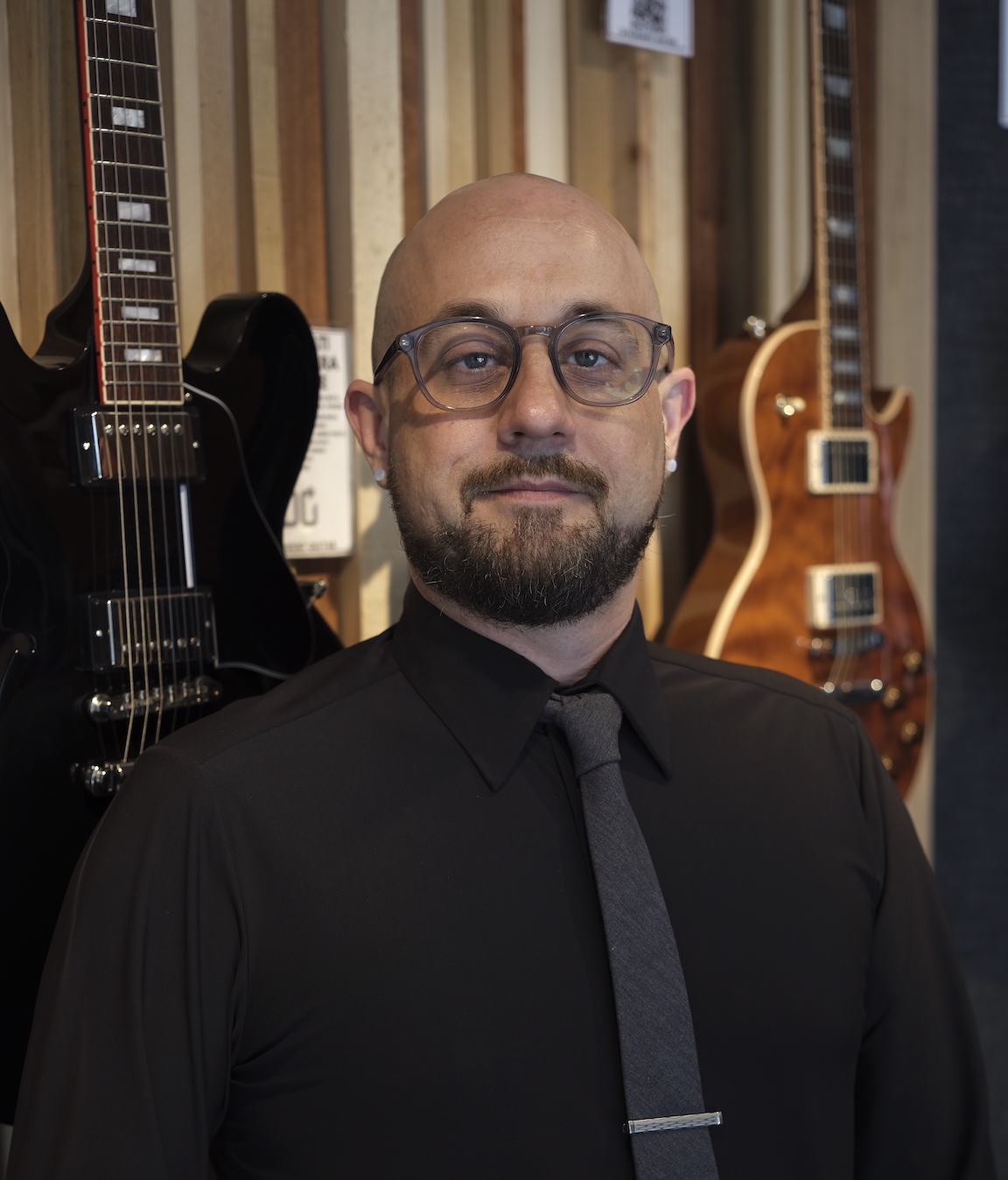
Crystal Morris
The biggest trend in guitars over the past year has been simply how well they’ve been selling. Suppliers express confidence that any guitar they make right now they can sell, while retailers say their biggest challenge is keeping them in stock.
Anyone in MI can quickly tell you the reason why — quarantine.
“The things that we filled our days with, a lot of those went away, and so people had to fill them with something else and I think making music really rose to the top,” said Gator President and CEO Crystal Morris speaking to Music Inc. while exhibiting during Believe In Music Week.
With this came a boom in online sales of musical instruments, particularly guitar, as it’s an instrument that’s easy to understand, get into your home and play quietly when necessary. But there’s a problem here. Are the people who bought all these guitars to either learn or get reacquainted with them likely to replicate that purchase, and keep buying accessories to go along with their new instrument, or was that a one-time thing? In short, will the boom go bust?
It’s a question that has occurred to Morris. “I’ve been putting a lot of thought into that because I do think that we maybe have a little bit of a bubble on our hands,” she said. “I believe we’re going to have more net-new music makers. But there is in some of these categories, in particular guitar, a bubble.”
Asked about this bubble, Gibson CEO James “JC” Curleigh emphasized the significance of people demonstrating their apparent confidence in buying guitars online last year, and where this trend is headed. “I think it’ll settle back into what we would call normal balance,” Curleigh said on the Monday after Believe In Music Week. He added that in April, May and June of last year, 90 percent of guitars were sold online, whereas prior to COVID-19, online sales of guitars were a third of that. “We as an industry predicted it could go to 50/50 over the next five years. So what’s really happened is that this acceleration into online took place because of COVID and consumers and fans are confident to buy online.”
Speaking to Music Inc. from his home office in Vancouver, Canada, during Believe In Music Week, Radial Engineering Product Manager Jay Porter was skeptical of the threat of online sales of guitars and related gear slowing down. He noted that enthusiasm for playing music and consumerism fuel each other. “Being a guy who has a recording studio and as a musician, I’m always looking for new stuff,” he said. “Retail therapy is a real thing. Do I need any of the [stuff] that I buy? No. A guitar and an amp is all I really need, but everybody always gets pumped on playing when they’ve got new stuff.”
Michael Kelly Guitars’ Steve Pisani pointed out that the collector mentality surrounding guitars insulates it from a slump. “One good thing about the guitar business — people don’t own only one guitar. They buy lot of guitars,” he said. “The people who just started, the beginners, now, six months later, they’re getting some traction, they’re playing a little bit, maybe they also want an acoustic because they bought the electric, Or they want to get something with a tremolo or a semi-hollow body or whatever.”
ESP Guitars’ Jeff Klopmeyer firmly backs up this idea. “You can ask just about any guitar player in the world, do they have enough guitars, and it doesn’t matter if they have one, 10 or 30, there’s always another guitar that they’d like to have,” he said.
If COVID-19 didn’t exist, Believe In Music Week would have been Klopmeyer’s 28th Winter NAMM Show, and add to that his exhibiting at 14 past Summer NAMM Shows. This length of experience leads him to dismiss the specter of the online sales bubble bursting for guitars. “There’s always been those types of doom-and-gloom predictions,” he said. “It’s understandable, but those of us who have been in this industry for a long time, we remember being told that with the power of synthesizers today, nobody will ever buy another guitar again. And then we were told a number of years ago that the used guitar market [was] going be so large that people purchasing guitars through eBay and Reverb and all the other services out there [would] eliminate the possibilities of selling new guitars. It has yet to come true.”
Eric Kirkland, a guitar designer at Vox Guitars, commented on how his company approaches design with respect to the used market. He pointed out that while his company has a rich history, particularly in placing guitars in the hands of venerable British rock musicians like the Rolling Stones’ Brian Jones and Bill Wyman, the company doesn’t concern itself with replicating those vintage instruments exactly because someone who wanted one would find the real thing.
“We do embrace the history of Vox and things like the original Vox Starstream with all the built in electronics,” he said. “That’s something that we don’t try to replicate, but we try to bring it forward. There’s far more choices now in terms of the technologies to apply to guitar and crazy sounds that we can dream up that wouldn’t wouldn’t have been possible with that.”
So, as guitars continue to sell well, particularly online, companies selling accessories and services that augment and support guitars are proving vital. Equipment care manufacturer Music Nomad is one such company, and during Believe In Music Week was promoting its new Keep It Simple, Setup Six Piece Setup Gauge Set and its website’s new Set Up Hub, both of which could prove essential for people having guitars shipped to their homes.
“We believe 90 percent of guitars never get set up,” said Rand Rognlien, Music Nomad’s CEO and founder, describing the set and hub. “This is going to create the opportunity for a lot of guitars to play and sound their best. It is going to improve and increase enjoying the instrument.”
New guitar buyers, particularly younger customers, may have different priorities in shopping for a guitar. They may want to know, say, how environmentally friendly a guitar is before making a purchase. “It’s really important for guitar buyers, especially younger guitar buyers coming up, to know that they can ask those questions,” said Michael Eck, brand editor for Breedlove Guitars. “They can walk into the dealer, when we can walk into dealers [again], or they can [go to] an online retailer and say, ‘Hey, I want to know about the origin of my guitar. I want to feel good about it.’”
In this spirit, Breedlove was promoting its Organic Collection during Believe In Music Week, which actually would have been Eck’s first NAMM Show had it occurred in person. “Sustainability has to become more and more of a focus point for manufacturers,” he said. “Because if we don’t all get together and figure out how to keep the planet healthy and keep the trees healthy, those of us who make instruments out of wood, we’re going to run out of that stuff if we’re not careful about it.” MI












